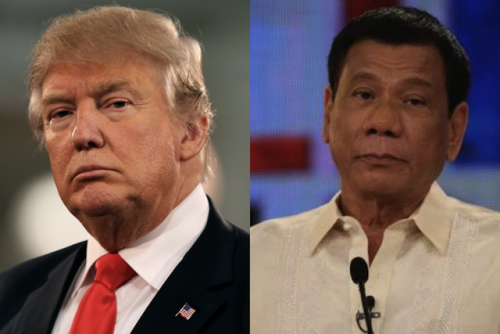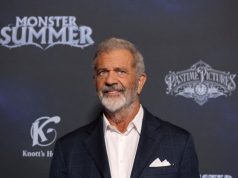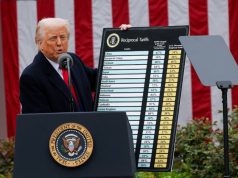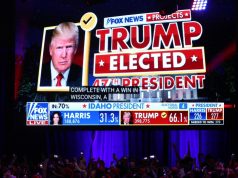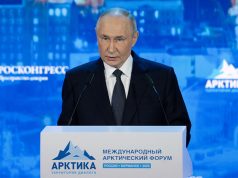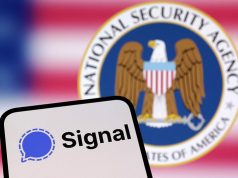Will Duterte visit Trump at the White House next year? Is Trump attending the ASEAN Summit in the Philippines also in 2017? Until very recently these were highly improbable events. Trump’s stunning election victory was the game changer. The triumph of Trump in the 2016 US presidential polls was not only shocking because his opponent Hilary Clinton was favored to win, but also because of the expected radical change in policies after the GOP upset win.
Trump’s victory bolsters the recent trend towards the ascendancy of authoritarian rulers which I discussed in end 2015 (Duterte in Context). Erdogan of Turkey had taken the authoritarian turn and Thailand is led by a ruling junta of Prayut Chan-o-cha. Trump thus joined Putin of Russia and Xi of China and recently elected authoritarian leaders Modi (India), Jokowi (Indonesia) and Duterte (Philippines). While there was a similar geopolitical trend in the 1930s and in the Cold War this is a singular period with the choice of the US of a populist authoritarian leader.
Many Filipinos and international observers are most interested in how the two foul-mouthed leaders Trump and Duterte would jell with each other. Duterte is sometimes referred to as “The Trump of the East” on account of their both being inclined to easily curse or say bad words at the slightest provocation. Would there be instant chemistry between two kindred spirits or would they be like poles that repel each other? There was a partial answer when the awaited phone conversation between Duterte and Trump was described as “very engaging and animated.”
Their infamous rhetoric and bluster are merely tips of the icebergs of their temperament and character. They are highly volatile, opportunistic doublespeakers prone to rants and misogynist talk authoritarian personalities. They both admire Putin, a model for the strongmen of this era. Duterte’s incendiary and strange statements sow confusion among his advisers and the public, causing him credibility problems. He frequently qualifies his statements or says that he was only joking. On the other hand, Trump would harangue, insult and lie so often that fact-checking his statements is a cottage industry. Trump’s campaign team had to remove his Twitter access days before the election, concerned about what their trigger-happy impulsive candidate will tweet. What will Duterte tweet if given the chance? Trump is in fact a milder version of Duterte in bombast. How would Americans react if Trump said that he would slaughter 3 million addicts or that he spoke with God and say afterwards that he was only joking? They both rode to election triumphs promising major changes in their respective countries.
Duterte in now typical fashion stated that Philippine-US ties are “as is” in an about-face from his startling “separation” statement during his China visit last October. He told American businesses to “pack up their bags and leave.” Now, he described himself in relation to Trump’s victory as just “a small molecule in the planet.” If he’s going out of his way to ingratiate himself with a like-minded leader like Trump he will likely be in for a supreme disappointment.
Philippine and US areas of engagement
It’s likely and not surprising that Trump with his strongman temperament and his repugnant comments against immigrants and minorities, and stress on US national security, would hardly care about the Philippine human rights record – something which delights Duterte. Unfortunately, US policy directions and priorities do not bode well for the Philippines. Trump’s major policy platform is to “make America great again” by turning inward, i.e., focusing on the domestic economy through protectionist measures and renegotiation of international treaties. The US is a superpower with worldwide engagements. However, it was also, for much of its history before World War I and in the interwar years, adhering to an isolationist policy to avoid getting embroiled in European wars while safeguarding the Americas from foreign intervention articulated through the Monroe Doctrine. Will Trump have his own version of the Monroe doctrine? The likely areas of major engagements based on his policy platform are as follows:
1. Trade. Complementing Trump’s foreign policy is what economists are describing as some form of 21st century Mercantilism – referring to the economic theory of the 16th to 18th century which argues that countries should aim for positive balance of trade. In a nutshell, in the binary world of Trump imports are bad and exports are good. The government supports exports through subsidies and discourages imports through tariffs. While the main targets of Trump are Mexico and China, this policy regime is disadvantageous to Philippine exporters. Philippine trade with the US is worth about $16.5 billion or a significant 3rd behind Japan and China. Any pressure on Philippine exports to the US is not only from possible Trump’s protectionist measures but also from the uncertainty generated by Duterte’s hostility to the US which is cited as the cause of canceled US$50 million worth of electronics exports.
2. Investments. The focus on the American domestic economy translates into subdued prospects for US investments in the Philippines. This focus on US domestic investments resonated with the American voting populace, especially in the Rust Belt states hard hit by foreign competition and the exodus of US companies. It is foreseen that a combination of both incentives and sanctions will encourage some US firms to stay in their domestic market and thereby save American jobs even as the US economy is at a full employment state. How will it affect the vital Philippine BPO industry dominated by US firms? It’s therefore crucial to maintain the image of national stability to make it easy for US firms to decide to invest/stay in the Philippines. This early, Trump’s policy is already being implemented. Air Conditioner manufacturing firm Carrier has decided to stay in Indiana instead of moving to Mexico that will save 1,000 US jobs in exchange for a US$7 million tax incentive from the state.
3. Immigration/OFWs. The Filipino Diaspora is a significant player in the Philippine economy. The estimated 4-million-strong Fil-Am community which Duterte belittled had contributed in 2015 fully one third, or US$8.5 billion of overseas Filipinos’ cash remittances (BSP). Duterte, who has Moro blood, harshly criticized the US massacre of Moros during the Philippine American war in the recent ASEAN meeting with Obama in attendance. However, Duterte has remained silent on Trump’s tirades against Muslims, minorities and immigrants and his branding of the Philippines as a “terrorist nation.” Did he not refer to the US as hypocritical? Given Trump’s record, did he expect that the US will now treat immigrants and minorities better? Uncertainty pervades among the American immigrant and minority communities with the rise of reported harassment of their members in the wake of Trump’s win? Trump has already announced that he will move decisively against undocumented aliens, which may affect a number of Filipinos.
4. Development Aid/Military Assistance. Human rights concerns by the US held up its shipment of 26,000 assault rifles for the PNP and it’s still unclear if it has final approval. Previously, in one of his inexplicable outbursts against the US, Duterte threatened to turn to Russia and China for arms purchases. Trump has recognized the strategic importance of the South China Sea and the outcome of the territorial dispute between Philippines and China. Even if Duterte and Trump recognized each other as kindred souls providing military assistance to the Philippines or for the US to shoulder the major cost of modernizing the Philippine military rails against the world view of Trump. He feels that Japan and NATO countries are free riders in getting US military protection without paying their proportionate share of the cost. Though human rights is not an issue with Trump the Philippines should not expect preferential financial terms in any purchase of US arms even as he pushes through with a massive arms build up. It’s the same outlook towards development assistance as Trump and his closest associates turn inward, close the American purse strings and play into the populist sentiment.
Thus, Duterte will likely just become deeply disappointed if he’s expecting any largesse from the US – substantial aid is possible but not likely. Will Duterte throw a tantrum and subsequently curse the US again? Of course having a Philippine special envoy to the US with ties to Trump will help but it goes against Trump’s focus on domestic policy issues and avoidance of foreign entanglements.
Even if geopolitics dictates that the US resume its Asian pivot under Trump’s terms and his advisers, it’s unlikely that it will try to outdo China in the economic package offered to the Philippines. This parsimonious US foreign policy will drive the Philippines deeper into the Chinese orbit. Duterte’s policy of pitting the Americans against the Chinese to maximize Philippine gains will backfire. China will exact more concessions from the Philippines which have a weak bargaining position without any US support. Duterte weakened the country’s position by kowtowing to China while simultaneously announcing his separation from the U.S. and launching diatribes against his country’s traditional partner in a bizarre translation of an “independent foreign policy.” Only last October Duterte histrionically declared that “There are three of us against the world. China, Philippines, Russia.” Then on November 29 the Russian ambassador stated that Russia is not interested in an alliance. The Administration’s spin doctors and apologists will try to play up the Trump connection as part of Duterte’s “strategic genius” to compensate for the Russian rebuff. But it will become evident that the gains will not be significant and that there are already costs incurred due to his hostility to the US.
A desire for change and the Duterte and Trump authoritarianism
Duterte and Trump were able to discern and exploit the desire for change of their nations in plotting their rise to power. How disruptive are Duterte and Trump in their assumption to power in their respective countries?
The weakness of Philippine institutions that originated from the country’s colonial history made them vulnerable to the machinations of ambitious politicians aspiring to become ruthless authoritarian rulers. That happened with the Marcos martial law regime and the signs are ominous that history will repeat under the creeping authoritarianism of President Duterte.
On the other hand, will Trump be able to subvert the US bureaucracy and political system? There is confidence that the American political system is strong enough with its necessary checks and balances to thwart any authoritarian design of Trump or any other president. There will be tensions, though that will test the strength and resiliency of US institutions. Trump is mercurial and a maverick who hobbles the successful navigation of the minefields of the US political system and bureaucracy where the art of tact and diplomacy are vital. Can he enforce his will by the force of his personality? In fact, his volatile temperament with his lack of government experience may make a deadly combination. The crux of the matter is his divergent world view. Trump’s mercantilist ideas are contrary to the GOP core belief of free trade. Trump will renegotiate NAFTA, withdraw from TTIP and disrupt NATO. There will be resistance from the bureaucrats and politicians who believe that US leadership and free trade is the source of US prosperity and prestige. Trump can be pragmatic when presented with compelling evidence. Thus, officials remain confident that he can be persuaded not to pursue policies inimical to the US. This is likely to be a tense and tumultuous presidential term.
Reforms are necessary in the context of current socioeconomic realities. Robust economic growth had resumed in the US, the Philippines and other countries. However, under neoliberalism and liberal democracy, the widening inequality accompanied loss of social mobility in the US. In the Philippines, alarming poverty levels persisted despite the rapid growth. The perception that the fruits of development are not shared equally gave rise to discontent, which made people vulnerable to the bid for power of demagogues such as Trump and Duterte.
People are desperate to embrace change despite the peril of choosing politicians who promise change but are bent on self-aggrandizement and iron grip rule based on a platform of hate, revolting rhetoric and the wanton disregard of human rights. Perhaps, strong US institutions can withstand Trump, but it is eminently unlikely for fragile Philippine institutions in the Duterte regime. We may be hearing now the death knell of neoliberalism. We may also be at the advent of an oppressive authoritarian era. Another painful lesson in history may be forthcoming.
*Author Cesar Polvorosa Jr. is a business school professor of economics, world geography, and international business management in Canada. He is also a published writer in economics, business, and literature.

